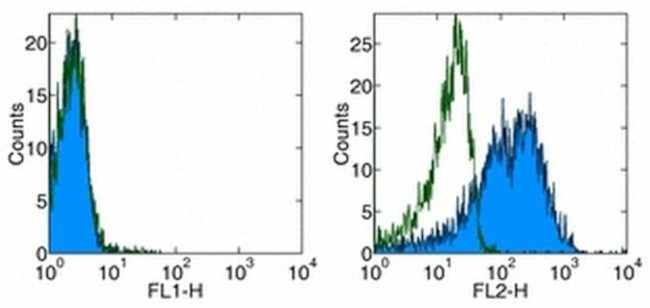Search Thermo Fisher Scientific
Invitrogen
CD137 Ligand (4-1BB Ligand) Monoclonal Antibody (TKS-1), Biotin, eBioscience™
FIGURE: 1 / 1
CD137 Ligand (4-1BB Ligand) Antibody (13-5901-82) in Flow

Product Details
13-5901-82
Species Reactivity
Published species
Host/Isotype
Recommended Isotype Control
Class
Type
Clone
Conjugate
Form
Concentration
Purification
Storage buffer
Contains
Storage conditions
Shipping conditions
RRID
Product Specific Information
Description: The TKS-1 monoclonal antibody reacts with mouse 4-1BB Ligand (4-1BBL), a type II transmembrane protein and a member of the tumor necrosis factor superfamily. 4-1BBL is expressed by activated antigen presenting cells including B cells and macrophages. Interaction of 4-1BBL with 4-1BB (CDw137) is reported to deliver a costimulatory signal important in the T-APC interaction.
Applications Reported: The TKS-1 antibody has been reported for use in flow cytometric analysis.
Applications Tested: The TKS-1 antibody has been tested by flow cytometric analysis of resting and 2-3 day (IgM & CD40)-activated mouse splenocytes. This can be used at less than or equal to 1 µg per test. A test is defined as the amount (µg) of antibody that will stain a cell sample in a final volume of 100 µL. Cell number should be determined empirically but can range from 10^5 to 10^8 cells/test. It is recommended that the antibody be carefully titrated for optimal performance in the assay of interest.
Filtration: 0.2 µm post-manufacturing filtered.
Target Information
CD137 ligand (CD137L) is a type II membrane protein and part of the TNF superfamily. CD137L is a co-stimulatory molecule that is expressed on antigen presenting cells (DCs, monocytes/macrophages, B cells) and is upregulated upon activation. Its receptor, CD137/4-1BB, is found on a variety of cells, including inflamed endothelial cells, where its expression enhances extravasation of CD137L expressing monocytes. Activated T cells also express CD137, and engagement with CD137L enhances T cell proliferation, IL-2 secretion, survival, and cytotoxic activity. CD137L is also expressed on a majority of B-cell lymphomas, including mantle cell lymphoma, follicular lymphoma, and diffuse large B-cell lymphoma (but it is lacking on Hodgkin lymphoma and T-cell lymphoma). CD137L is also expressed in carcinoma cell lines, and is thought to be involved in T cell-tumor cell interactions.
For Research Use Only. Not for use in diagnostic procedures. Not for resale without express authorization.
Bioinformatics
Protein Aliases: 4 1 BB Ligand; 4 1 BBL; 4-1BB ligand; 4-1BBL; 41BB Ligand; 41BBL; CD 137 Ligand; CD 137L; CD137 Ligand; CDw137L; TNFRSF9; Tumor necrosis factor ligand superfamily member 9
Gene Aliases: 4-1BB-L; 4-1BBL; AI848817; Cd137l; Cd157l; Ly63l; Tnfsf9
UniProt ID: (Mouse) P41274
Entrez Gene ID: (Mouse) 21950

Performance Guarantee
If an Invitrogen™ antibody doesn't perform as described on our website or datasheet,we'll replace the product at no cost to you, or provide you with a credit for a future purchase.*
Learn more
We're here to help
Get expert recommendations for common problems or connect directly with an on staff expert for technical assistance related to applications, equipment and general product use.
Contact tech support
